Do Slugs Eat Petunias? Tips to Protect Your Flowers
Slugs are one of the most common pests in gardens. If you have petunias, you might be worried about them being targeted. Yes, slugs do eat petunias, leaving unsightly holes in the leaves and flowers. These pests significantly affect the beauty of your garden and can become a frustrating problem for any gardener.
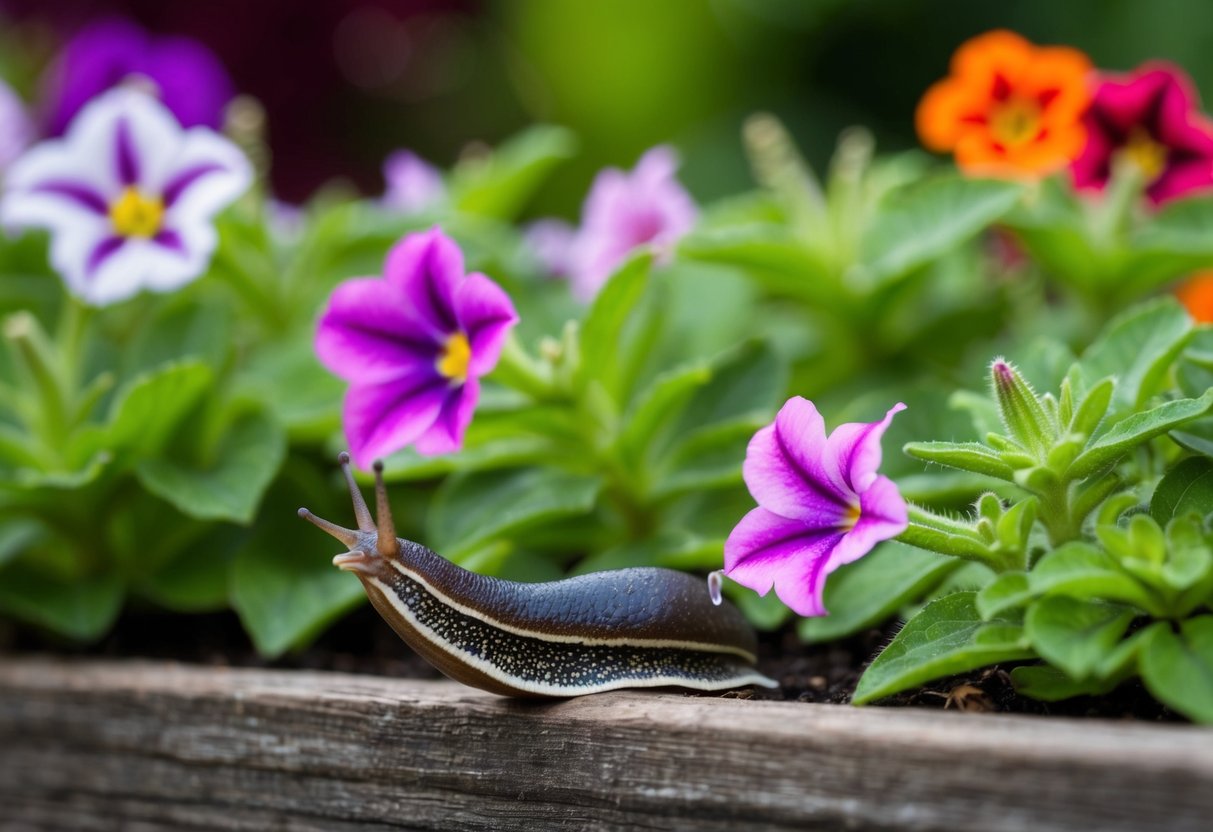
You may wonder why slugs are so attracted to your petunias. The combination of moist soil and delicious foliage makes these plants irresistible to these slimy critters.
If you spot holes in the leaves or notice your petunias looking a bit chewed up, you may have slugs to blame.
Don’t lose hope, though. There are ways to protect your beautiful blooms from these pests. With the right methods, you can keep your garden healthy and thriving. Keep reading to learn all about effective strategies for pest control, ensuring your petunias stay protected and vibrant.
Understanding Slugs and Petunias

Slugs are fascinating creatures that live in damp environments and are known to feed on a variety of plants, including petunias. Petunias’ vibrant colors and scents can attract these pests, leading to damage that might ruin your garden’s beauty.
The Biology of Slugs
Slugs are soft-bodied mollusks, similar to snails but without a shell. They prefer moist and cool environments, making them common in gardens with debris and thick foliage. These conditions help them retain moisture, as they need it to survive.
Slugs have a radula, a tongue-like organ with tiny teeth used to scrape or cut food. This allows them to eat through plant leaves and stems effectively.
Slugs are nocturnal and mostly feed at night, which makes detecting them during the day challenging. They leave behind a slimy trail that helps them glide across surfaces, which can sometimes indicate their presence. You’ll often find them hiding under leaves or rocks during daylight, waiting to come out as it gets cooler.
The Allure of Petunias
Petunias are popular flowering plants that appeal to gardeners because of their brightly colored blooms and pleasant fragrance. Slugs find the foliage and flowers of petunias particularly appetizing. This attraction can lead to jagged holes in the leaves and petals, seriously affecting the plant’s ability to thrive.
These plants can suffer from stunted growth if slugs are not controlled.
It’s essential to keep your garden tidy to prevent slug infestations. Removing debris and providing adequate drainage can make the environment less appealing for slugs. If slugs become a problem, consider installing barriers such as sharp sand or broken eggshells to deter them from reaching your petunias.
Common Garden Pests and Petunia Threats
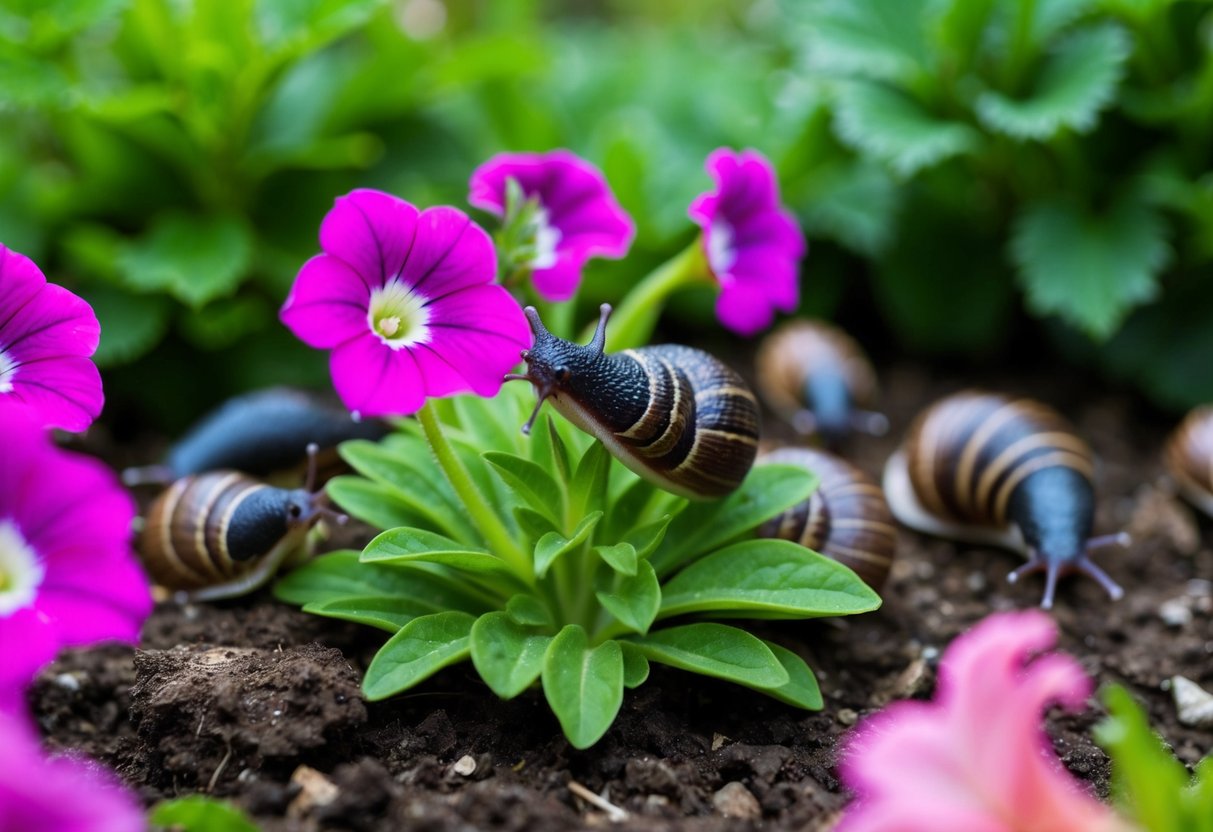
Petunias can face many threats from garden pests. Slugs are a common problem, but there are also other organisms that can harm your blooms. Learning to identify these issues helps keep your garden thriving.
Identifying Slug Damage
Slugs are notorious for munching on petunias. They create irregular holes in the leaves and flowers, making the plants look ragged. You might find slimy trails on the soil or on the plants themselves.
Left unchecked, slugs can cause serious harm to your petunias. They feed mainly at night, so it’s harder to catch them in action.
It’s essential to regularly check your plants for signs of these pesky critters. Keeping your garden free of debris like fallen leaves and branches makes it harder for slugs to hide. This can reduce their impact significantly over time.
Other Petunia Pests
Besides slugs, there are several other pests to watch out for. Snails, like slugs, leave holes in petunias. They also leave shiny trails on foliage.
Aphids are small, soft-bodied insects. They suck sap from petunia stems, which can cause the leaves to curl and yellow.
Caterpillars enjoy munching on petunia leaves, causing extensive damage if ignored.
Larger animals can also be a threat. Deer and rabbits might graze on your petunias. Birds and squirrels sometimes nibble on the plants too. Even small rodents like mice, voles, and chipmunks may occasionally cause damage.
Regular inspection and maintenance of your garden help fend off these threats and keep your petunias blooming beautifully.
Preventive Measures and Natural Deterrents
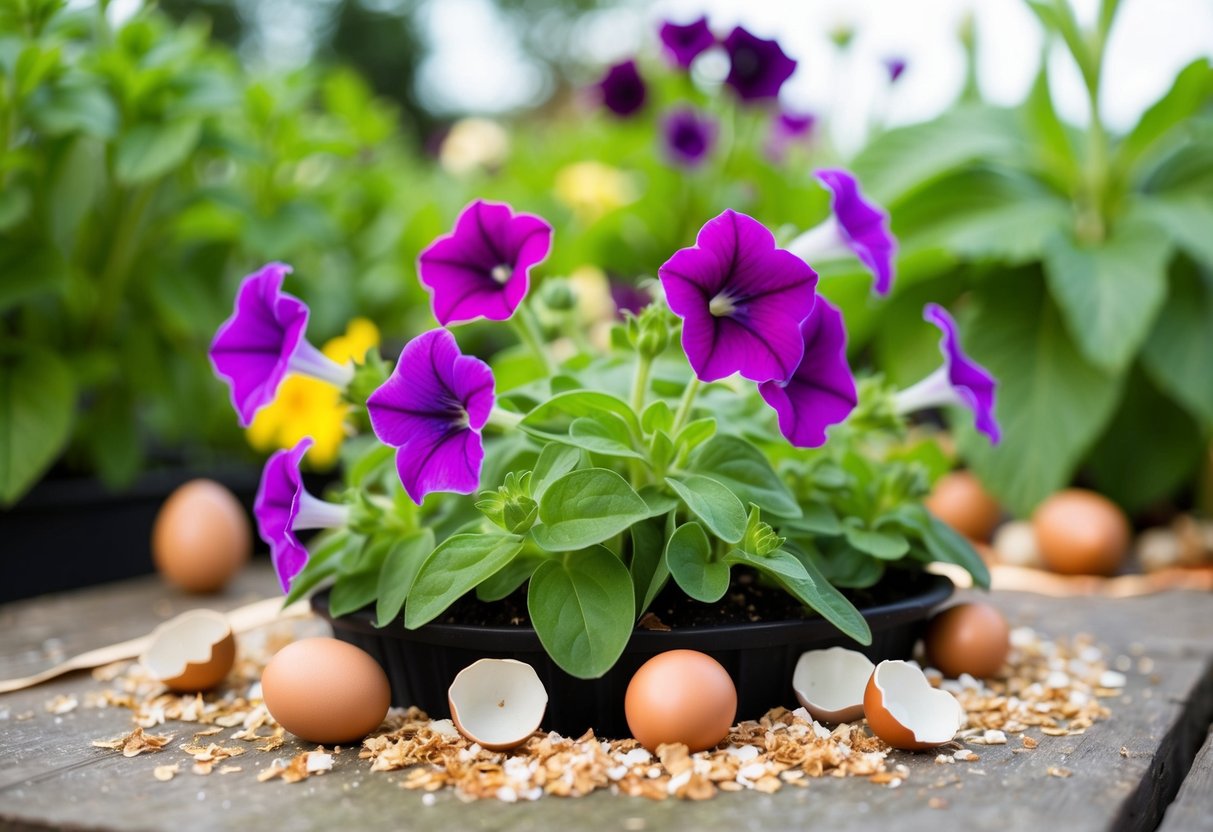
Slugs love to munch on petunias, but there are ways to protect your garden. You can use physical barriers, attract natural predators, and apply organic repellents to keep these pests at bay.
Creating Physical Barriers
Physical barriers can help you prevent slugs from reaching your petunias. Copper tape is effective because slugs dislike the sensation it gives them, deterring them from crossing it. Wrap copper tape around your pots or garden beds.
Another option is to use eggshells, coffee grounds, or diatomaceous earth. Sprinkle these sharp or rough materials around your plants as slugs find them uncomfortable to cross.
A simple fence made from plastic or metal can also help block them from accessing your flowers. Building these barriers keeps your blooms safer from slug damage.
Attracting Natural Predators
Bringing natural predators into your garden can help control slugs. Ground beetles, toads, and nematodes are among the creatures that feast on these pests.
You can encourage beetles and toads by providing rocks or logs for shelter.
Adding a small pond or moist area can attract toads, which enjoy a wet habitat. For nematodes, you can purchase them from garden centers and introduce them to your soil.
Another option is keeping ducks or chickens, as they love to snack on slugs. Letting them roam can naturally reduce your slug population.
Using Organic Repellents
Organic repellents offer another layer of protection. Coffee grounds not only act as a barrier but also work as a repellent due to their caffeine content, which is toxic to slugs. You can sprinkle used coffee grounds around your plants to deter them.
Moreover, creating a spray with garlic or vinegar can help keep slugs away. Mix these with water and spray around the base of your plants.
Repellents like beer traps can attract slugs, which then drown in the liquid, helping manage their numbers. Using these organic methods adds yet another tool to your garden protection strategy.
Chemical and Biological Solutions
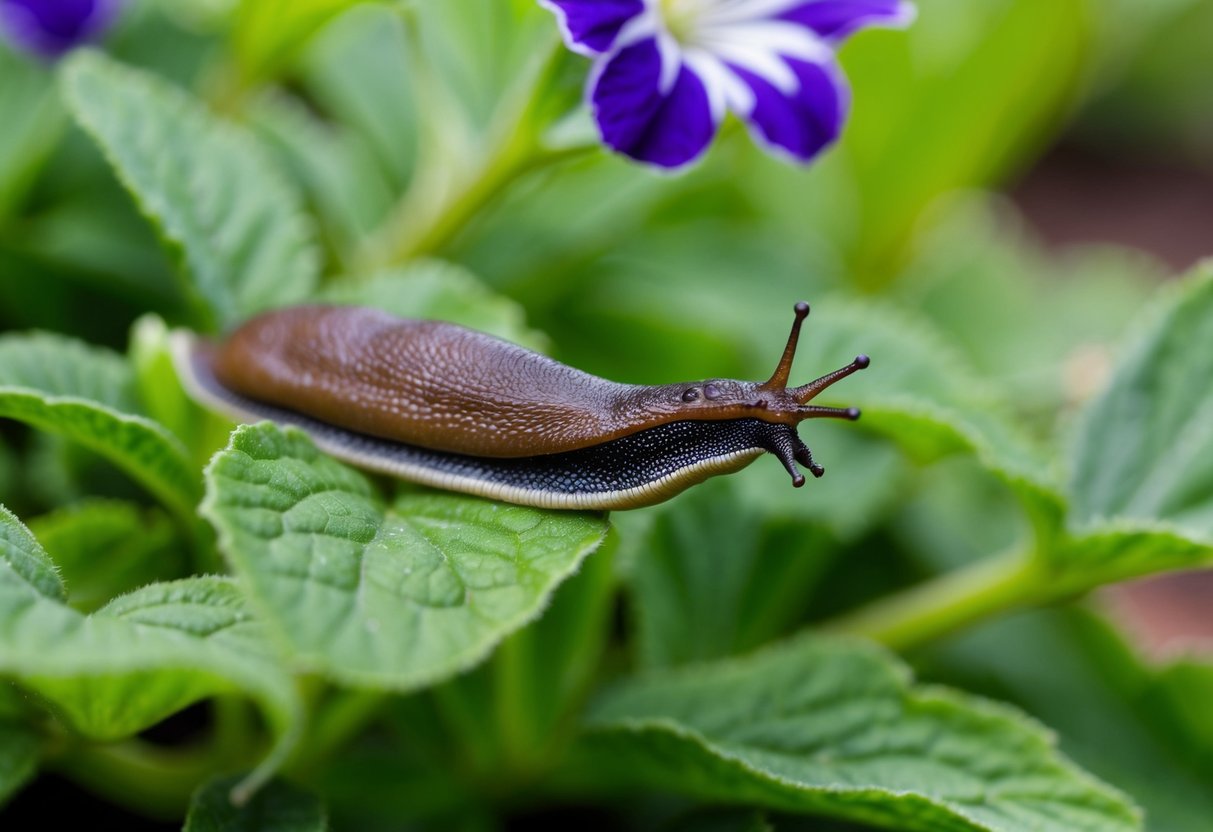
When dealing with slugs eating your petunias, you can choose between chemical treatments to directly target the pests or biological controls to manage them naturally. Each method offers distinct advantages to protect your plants and enhance your garden’s health.
Chemical Treatments
One common chemical treatment involves the use of metaldehyde. This compound works by dehydrating slugs, but it can be toxic to pets and wildlife, so you need to use it with caution.
Alternatively, you might consider iron phosphate, which is safer and works by disrupting the pests’ digestive process.
Insecticidal soaps and neem oil are other options you might use. These solutions focus more on soft-bodied insects but can also impact slugs to some degree.
Horticultural oils can be used for broader pest control, targeting a variety of garden pests.
Biological Controls
Biological solutions often turn to natural predators or substances.
Bacillus thuringiensis is a bacterium that targets certain insect larvae, offering an alternative if you’re looking for environmentally friendly options.
Consider using garlic spray to repel slugs. This method is non-toxic, making it ideal if you’re concerned about other animals or children in your garden.
Encouraging natural slug predators, like birds or ground beetles, can also help keep slug populations in check, creating a balanced ecosystem.
Garden Maintenance Practices
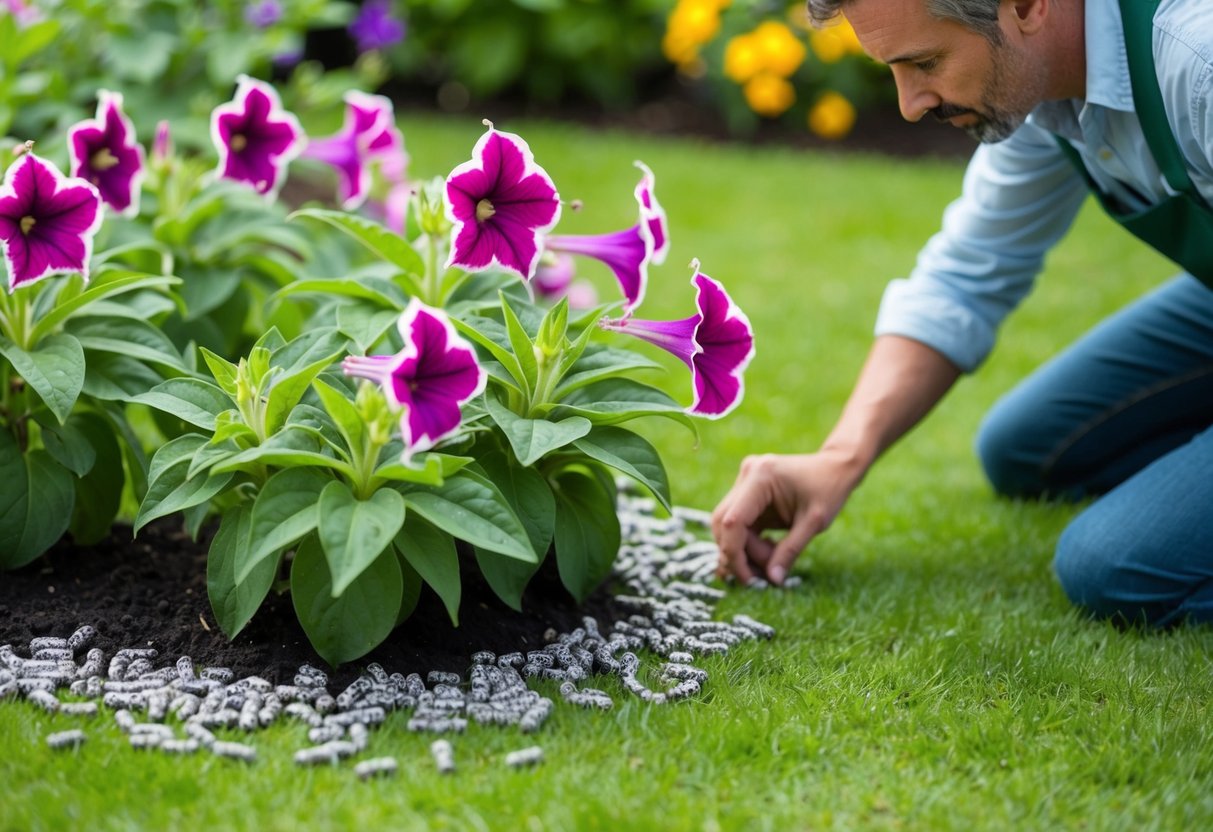
Proper garden maintenance is crucial for protecting your petunias from pests like slugs. By focusing on watering techniques and garden clean-up, you can keep your flower beds healthy.
Effective Watering Techniques
Watering your garden correctly keeps your petunias vibrant and less prone to slug damage. Slugs thrive in moist environments, so it’s essential to water early in the morning. This allows plants to dry out by evening when slugs are most active.
Consider using a drip irrigation system that delivers water directly to the roots. This minimizes the moisture on leaves and surrounding soil, making it less inviting for slugs.
Also, ensure your garden has a good drainage system to prevent water from pooling.
Mulching and Garden Clean-Up
Mulching helps maintain soil moisture. However, you must use the right type of mulch to deter slugs. Opt for coarser materials like bark or wood chips, which are less appealing to these pests.
Regularly cleaning your garden is equally important. Clear away debris like fallen leaves and branches, as these provide hiding spots for slugs during the day. Keep your flower beds neat by edging them regularly.
Practicing integrated pest management techniques can also reduce the risk of slug infestations. This includes monitoring for early signs of slugs and taking immediate action.







